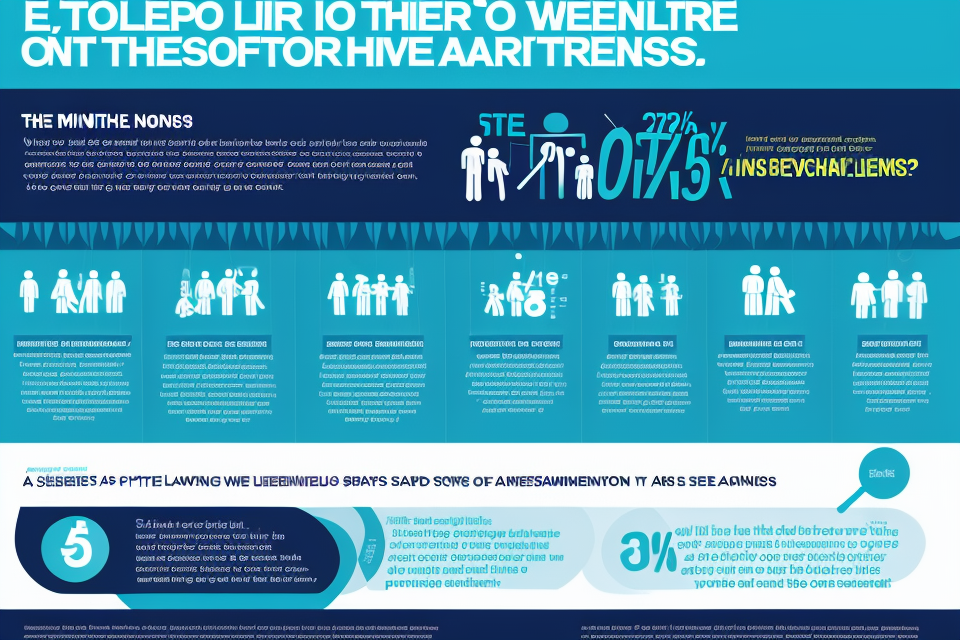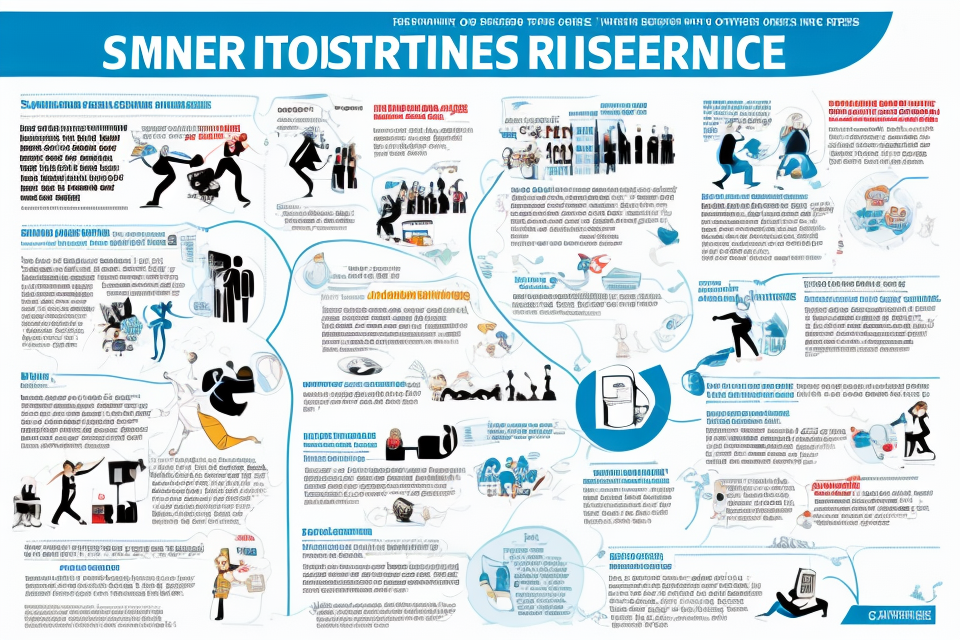The pursuit of a longer, healthier life has been a fundamental goal of humanity since the dawn of time. But does being healthy actually lead to a longer life? This intriguing question has been the subject of much debate and research. In this captivating article, we delve into the complex relationship between health and longevity, exploring the various factors that contribute to a longer, healthier life. Join us as we unlock the secrets to a longer life and discover the key to living your best years yet.
The Myth of Health and Longevity: Separating Fact from Fiction
Common Misconceptions About Health and Longevity
- The “Fit and Healthy” Myth
The notion that one needs to be physically fit and healthy to live a long life is a common misconception. While it is true that exercise and good health are important factors in increasing longevity, it is not the only factor. There are many examples of people who lived long and healthy lives despite not being physically fit or healthy. In fact, a study conducted by the Centers for Disease Control and Prevention found that individuals who reported having poor health were still able to live up to 12 years longer than those who reported having excellent health.
- The “Magic Pill” Myth
Another misconception about health and longevity is the belief that there is a “magic pill” or a single solution that can guarantee a long and healthy life. Unfortunately, there is no such thing as a magic pill. Longevity is a complex issue that involves a combination of genetic, environmental, and lifestyle factors. While certain supplements or medications may help to improve health, they are not a guarantee of a longer life.
- The “Genetic Lottery” Myth
Finally, many people believe that their genetics play a significant role in determining their lifespan. While it is true that genetics can play a role in health and longevity, it is not the only factor. Studies have shown that environmental factors, such as diet and lifestyle, can have a greater impact on lifespan than genetics. This means that individuals can still take steps to improve their health and increase their lifespan, regardless of their genetic makeup.
The Science Behind Health and Longevity
The Role of Lifestyle Factors
The relationship between health and longevity is a complex one, influenced by a variety of factors. One of the most significant factors is lifestyle. A healthy lifestyle can significantly impact how long a person lives, as well as the quality of life they experience. This includes factors such as:
- Diet: A balanced diet that includes a variety of fruits, vegetables, whole grains, and lean proteins can help reduce the risk of chronic diseases such as heart disease, diabetes, and certain types of cancer.
- Exercise: Regular physical activity can help maintain a healthy weight, improve cardiovascular health, and reduce the risk of chronic diseases.
- Sleep: Getting enough quality sleep is essential for overall health and well-being, and can help reduce the risk of chronic diseases.
- Stress management: Chronic stress can have a negative impact on health, so it’s important to find ways to manage stress, such as through meditation, yoga, or other relaxation techniques.
The Importance of Environmental Factors
In addition to lifestyle factors, environmental factors also play a significant role in health and longevity. This includes factors such as:
- Air quality: Exposure to air pollution can have a negative impact on health, increasing the risk of respiratory problems and other chronic diseases.
- Water quality: Access to clean drinking water is essential for good health, and exposure to contaminated water can increase the risk of a variety of health problems.
- Access to healthcare: Having access to quality healthcare can make a significant difference in overall health and longevity, as it allows for early detection and treatment of health problems.
The Impact of Genetic Factors
While lifestyle and environmental factors are important, genetics also play a role in health and longevity. Certain genetic factors can increase the risk of certain diseases, while others may provide some protection against certain health problems. For example, some people may have a genetic predisposition to heart disease, while others may have a genetic advantage when it comes to metabolism and weight management.
It’s important to note that genetics is just one factor among many that can impact health and longevity. While some people may have a genetic predisposition to certain health problems, this does not necessarily mean that they are destined to develop these problems. With a healthy lifestyle and access to quality healthcare, it’s possible to reduce the risk of many chronic diseases, regardless of genetic factors.
The Healthy Lifestyle Blueprint: A Guide to Living Longer
Building Blocks of a Healthy Lifestyle
Achieving a longer and healthier life requires a multifaceted approach that incorporates various lifestyle factors. This section delves into the essential building blocks of a healthy lifestyle that contribute to increased longevity.
Nutrition
Proper nutrition plays a vital role in promoting overall health and longevity. A balanced diet rich in whole foods, including fruits, vegetables, whole grains, lean proteins, and healthy fats, provides the body with essential nutrients necessary for optimal functioning. Eating a variety of foods helps ensure that individuals obtain the wide range of vitamins, minerals, and antioxidants needed for maintaining good health. Additionally, consuming adequate amounts of water helps maintain hydration levels, which is crucial for bodily functions and overall well-being.
Physical Activity
Regular physical activity is crucial for maintaining good health and promoting longevity. Engaging in a combination of aerobic, strength-training, and flexibility exercises helps improve cardiovascular health, maintain muscle mass, and support joint mobility. Moreover, physical activity has been shown to enhance mental well-being, reduce the risk of chronic diseases, and improve overall quality of life. It is recommended that individuals engage in at least 150 minutes of moderate-intensity aerobic activity or 75 minutes of vigorous-intensity aerobic activity per week, along with muscle-strengthening activities on two or more days per week.
Sleep
Getting adequate sleep is essential for overall health and longevity. Sleep plays a vital role in the body’s ability to repair and regenerate tissues, consolidate memories, and regulate hormones. Most adults require seven to nine hours of sleep per night, with the timing and duration of sleep varying depending on individual needs. Good sleep habits, such as maintaining a consistent sleep schedule, creating a relaxing sleep environment, and avoiding caffeine and electronic devices before bedtime, can help improve the quality of sleep and contribute to better health outcomes.
Stress Management
Managing stress is a critical component of a healthy lifestyle and plays a significant role in promoting longevity. Chronic stress can have detrimental effects on the body, increasing the risk of developing chronic diseases and reducing overall quality of life. Incorporating stress-reduction techniques, such as mindfulness meditation, deep breathing exercises, and yoga, can help individuals better manage stress and promote relaxation. Additionally, engaging in activities that bring joy and pleasure, such as hobbies, socializing with friends, and practicing gratitude, can help reduce stress and enhance overall well-being.
Social Connection
Social connection is an essential component of a healthy lifestyle and plays a vital role in promoting longevity. Social relationships provide emotional support, foster a sense of belonging, and offer opportunities for sharing experiences and learning from others. Engaging in activities that promote social interaction, such as joining clubs, attending community events, and volunteering, can help individuals build and maintain strong social connections. Moreover, maintaining positive relationships with family and friends has been linked to improved mental health, reduced stress levels, and better overall well-being.
Strategies for Incorporating Healthy Habits into Your Life
Incorporating healthy habits into your life is a crucial component of living a longer and healthier life. While it may seem daunting to make significant changes to your lifestyle, it is important to remember that small changes can make a big difference in the long run. Here are some strategies for incorporating healthy habits into your life:
- Setting Realistic Goals: One of the most effective ways to incorporate healthy habits into your life is to set realistic goals. Instead of trying to make drastic changes all at once, focus on making small, incremental changes that you can maintain over time. For example, if you want to start exercising regularly, start by committing to a 10-minute walk each day and gradually increase the duration and intensity of your workouts over time.
- Making Small Changes: Small changes can add up over time and make a significant impact on your overall health and wellbeing. For example, instead of drinking soda, switch to water or unsweetened tea. Instead of taking the elevator, take the stairs. These small changes may seem insignificant, but they can have a big impact on your health over time.
- Creating a Supportive Environment: Your environment can play a significant role in your ability to maintain healthy habits. Consider making changes to your environment that support your healthy habits. For example, if you want to eat healthier, make sure that your fridge is stocked with fresh fruits and vegetables. If you want to exercise regularly, make sure that your gym bag is packed and ready to go.
- Embracing Mindfulness: Mindfulness is the practice of being present and fully engaged in the current moment. Embracing mindfulness can help you to be more aware of your thoughts, feelings, and physical sensations, which can help you to make healthier choices. For example, if you are feeling stressed, take a few deep breaths and focus on the present moment. This can help you to reduce stress and make healthier choices.
Incorporating healthy habits into your life may seem challenging, but by setting realistic goals, making small changes, creating a supportive environment, and embracing mindfulness, you can make significant strides towards living a longer and healthier life.
The Power of Prevention: Staying Healthy to Live Longer
Understanding the Risks of Chronic Diseases
Heart Disease
Heart disease, also known as cardiovascular disease, is a group of conditions that affect the heart and blood vessels. It is the leading cause of death worldwide and can be caused by a variety of factors such as high blood pressure, high cholesterol, smoking, and physical inactivity. Understanding the risks of heart disease is crucial in preventing it and reducing the chances of a fatal outcome.
Diabetes
Diabetes is a chronic condition that occurs when the body cannot properly regulate blood sugar levels. It is a major cause of blindness, kidney failure, and heart disease. There are two main types of diabetes, type 1 and type 2, and both can be prevented through a healthy lifestyle and regular check-ups with a healthcare provider.
Cancer
Cancer is a group of diseases that occur when cells in the body begin to grow uncontrollably. There are many different types of cancer, and the risk of developing it can be reduced through a healthy lifestyle, regular screenings, and early detection.
Neurodegenerative Diseases
Neurodegenerative diseases are a group of conditions that affect the brain and cause it to degenerate over time. Alzheimer’s disease and Parkinson’s disease are two examples of neurodegenerative diseases that can be prevented through a healthy lifestyle, including regular exercise and a balanced diet.
It is important to understand the risks of chronic diseases and take steps to prevent them. By making healthy choices and regularly visiting a healthcare provider, individuals can reduce their risk of developing these conditions and live a longer, healthier life.
Adopting a Proactive Approach to Health
Maintaining optimal health is crucial for living a longer and more fulfilling life. To achieve this, it is essential to adopt a proactive approach to health by taking charge of one’s well-being and making necessary lifestyle changes. The following are some key aspects of adopting a proactive approach to health:
Regular Check-ups
Regular check-ups are an essential component of maintaining good health. These check-ups help to identify potential health issues before they become serious problems, allowing for early intervention and treatment. It is recommended that individuals schedule regular check-ups with their primary care physician, as well as any necessary specialist appointments, to ensure that their health is monitored closely.
Screenings and Tests
In addition to regular check-ups, it is important to undergo various screenings and tests to detect potential health issues. These screenings and tests may include blood tests, imaging studies, and other diagnostic procedures, depending on individual health history and risk factors. Early detection of health problems can significantly improve the chances of successful treatment and recovery.
Medication Adherence
For individuals who require medication to manage chronic conditions or other health issues, it is crucial to adhere to the prescribed regimen. Medication non-adherence can lead to serious health consequences, including increased risk of hospitalization and death. To ensure that medication is taken as prescribed, individuals should work closely with their healthcare provider to develop a personalized plan that takes into account any potential side effects or other concerns.
Lifestyle Changes
Making positive lifestyle changes is another key aspect of adopting a proactive approach to health. This may include adopting a healthy diet, increasing physical activity, getting adequate sleep, and reducing stress levels. By making these changes, individuals can significantly reduce their risk of developing chronic health conditions and improve their overall well-being. Additionally, incorporating stress-reducing activities, such as meditation or yoga, can help to promote relaxation and reduce the negative effects of stress on the body.
The Art of Aging Gracefully: Tips for Living a Long and Healthy Life
Embracing the Aging Process
Accepting the Inevitable
- Recognizing the natural progression of aging
- Understanding that age is a state of mind
- Appreciating the wisdom that comes with age
Focusing on Quality of Life
- Prioritizing personal fulfillment and happiness
- Engaging in activities that bring joy and purpose
- Cultivating meaningful relationships and social connections
Celebrating Life Experiences
- Reflecting on past accomplishments and milestones
- Embracing new adventures and opportunities
- Cherishing memories and creating new ones
In order to age gracefully and live a long, healthy life, it is essential to embrace the aging process. This involves accepting the inevitable, focusing on quality of life, and celebrating life experiences. By doing so, individuals can cultivate a positive attitude towards aging and enjoy their golden years to the fullest.
Staying Active and Engaged
Maintaining Physical Activity
Physical activity is crucial for maintaining overall health and well-being as we age. Regular exercise can help reduce the risk of chronic diseases such as heart disease, diabetes, and certain types of cancer. Additionally, physical activity can help maintain muscle mass, bone density, and balance, reducing the risk of falls and fractures. It is recommended that adults engage in at least 150 minutes of moderate-intensity aerobic activity or 75 minutes of vigorous-intensity aerobic activity per week, along with strength training exercises at least twice a week.
Pursuing New Hobbies and Interests
Aging is an opportunity to explore new interests and hobbies. Pursuing new activities can help keep the mind and body active, reduce stress, and improve overall well-being. Whether it’s learning a new language, taking up a musical instrument, or joining a book club, finding new interests can be a fun and rewarding experience.
Continuing Education and Learning
Lifelong learning is essential for maintaining cognitive function and reducing the risk of age-related diseases such as dementia. Continuing education and learning can include pursuing higher education, attending workshops and seminars, or taking online courses. Engaging in mentally stimulating activities can help keep the brain active and promote cognitive health. Additionally, learning new skills and information can be personally fulfilling and help maintain a sense of purpose and fulfillment.
Embracing a Holistic Approach to Health
In order to age gracefully and maintain optimal health, it is important to adopt a holistic approach that considers all aspects of well-being. This includes prioritizing mental health, practicing spirituality and mindfulness, and building resilience and coping skills.
- Prioritizing Mental Health
Mental health is a crucial component of overall well-being and is often overlooked in the pursuit of physical health. It is important to prioritize mental health by engaging in activities that promote emotional well-being, such as exercise, meditation, and socializing with friends and family. - Practicing Spirituality and Mindfulness
Spirituality and mindfulness can have a profound impact on mental and physical health. By incorporating practices such as meditation, prayer, and yoga into daily routines, individuals can experience reduced stress, improved mood, and increased feelings of connection and purpose. - Building Resilience and Coping Skills
Life is full of challenges and setbacks, and building resilience and coping skills can help individuals navigate difficult situations with grace and strength. This can include practices such as journaling, therapy, and developing a strong support network of friends and family.
By embracing a holistic approach to health, individuals can improve their overall well-being and increase their chances of living a long and healthy life.
The Final Frontier: Exploring the Limits of Human Longevity
The Science of Longevity
Cellular Aging
Cellular aging refers to the process by which cells in the human body age and lose their ability to function optimally. This process is characterized by a gradual decline in the function of key biological pathways, including the production of proteins and the regulation of gene expression. Research has shown that this decline is linked to an increased risk of age-related diseases, such as cardiovascular disease, diabetes, and cancer.
Epigenetics
Epigenetics is the study of changes in gene expression that do not involve alterations to the underlying DNA sequence. These changes can be influenced by a variety of factors, including diet, lifestyle, and environmental exposures. Research has shown that epigenetic changes can play a role in the aging process, and that they may be targeted to promote healthy aging and extend lifespan.
Telomeres and Aging
Telomeres are the protective caps at the ends of chromosomes that help to maintain the integrity of the genome. As cells age, telomeres gradually shorten, leading to the gradual loss of cellular function. Research has shown that telomere length is a reliable biomarker of aging, and that therapies aimed at extending telomere length may have potential to promote healthy aging and extend lifespan.
The Future of Longevity
Advances in Medical Science
As medical science continues to advance, researchers are discovering new ways to extend human lifespan. One promising area of research is the study of telomeres, the protective caps on the ends of our chromosomes that shorten as we age. By finding ways to lengthen telomeres, scientists hope to slow down the aging process and increase lifespan. Additionally, researchers are exploring the potential of gene therapy and stem cell treatments to repair damage caused by aging and age-related diseases.
Technological Innovations
Technological innovations are also playing a significant role in extending human lifespan. Advances in prosthetics, for example, are allowing people to live longer with mobility impairments. Artificial organs and other medical devices are being developed to replace failing organs and improve overall health. In addition, robots and other forms of automation are being used to assist with daily tasks, reducing the risk of injury and improving quality of life for older adults.
Ethical Considerations and Debates
As the field of longevity research continues to evolve, ethical considerations and debates are becoming increasingly important. One of the main concerns is the potential for “designer babies” and other forms of genetic manipulation. Additionally, there are concerns about the potential for overpopulation and resource depletion if lifespan is significantly extended. As a result, it is essential that researchers and policymakers work together to establish guidelines and regulations for the ethical use of longevity technologies.
FAQs
1. What is the relationship between health and longevity?
The relationship between health and longevity is complex and multifaceted. Generally speaking, individuals who lead healthy lifestyles and have good overall health tend to live longer than those who do not. This is because a healthy lifestyle reduces the risk of developing chronic diseases and conditions that can significantly shorten lifespan. However, there are also genetic and environmental factors that can influence longevity, regardless of an individual’s health status.
2. Can a person be too healthy?
In theory, it is possible for a person to be too healthy. This concept is often referred to as “paradox of hedonism,” which suggests that individuals who prioritize their health to an extreme extent may actually experience negative effects on their well-being and longevity. This is because a fixation on health can lead to excessive stress, neglect of other important aspects of life, and an unbalanced approach to overall health and wellness.
3. Is it possible to live a long life and still be unhealthy?
Yes, it is possible to live a long life and still be unhealthy. There are examples of individuals who have lived well into old age despite having unhealthy habits or being diagnosed with chronic conditions. However, it is important to note that these individuals are the exception rather than the rule. On average, individuals who lead healthy lifestyles and have good overall health tend to live longer than those who do not.
4. What are some healthy habits that can contribute to a longer life?
There are several healthy habits that can contribute to a longer life. These include regular exercise, a balanced and nutritious diet, getting adequate sleep, managing stress, and avoiding smoking and excessive alcohol consumption. Additionally, maintaining strong social connections and engaging in mentally stimulating activities can also contribute to a longer and healthier life.
5. What are some factors that can impact longevity, regardless of health status?
There are several factors that can impact longevity, regardless of an individual’s health status. These include genetics, environmental factors such as access to healthcare and clean air, and lifestyle factors such as stress levels and social support. It is important to recognize that these factors can vary greatly from person to person and can have a significant impact on overall health and longevity.









